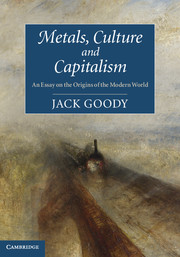Book contents
- Frontmatter
- Contents
- Maps
- Plates
- Preface
- Acknowledgements
- Chronology
- Part I Explorers
- 1 The Age of Metals in the Ancient Near East
- 2 A Bronze Age without bronze
- 3 Metals and society
- 4 Trade and religion in the Mediterranean
- 5 The coming of the Iron Age and classical civilisation
- 6 After the Romans
- Part II Merchants
- Part III Accumulators
- Appendix 1 The metallurgy of iron
- Appendix 2 Damascene steel and blades
- Glossary (with the aid of J. A. Charles)
- Bibliography
- Index
- Plate section
2 - A Bronze Age without bronze
Published online by Cambridge University Press: 05 June 2014
- Frontmatter
- Contents
- Maps
- Plates
- Preface
- Acknowledgements
- Chronology
- Part I Explorers
- 1 The Age of Metals in the Ancient Near East
- 2 A Bronze Age without bronze
- 3 Metals and society
- 4 Trade and religion in the Mediterranean
- 5 The coming of the Iron Age and classical civilisation
- 6 After the Romans
- Part II Merchants
- Part III Accumulators
- Appendix 1 The metallurgy of iron
- Appendix 2 Damascene steel and blades
- Glossary (with the aid of J. A. Charles)
- Bibliography
- Index
- Plate section
Summary
The Near East was the kernel of the Age of Metals but itself had few of these and other materials such as wood and sometimes even stone for building. For these it had to search and exchange among ‘barbarians’, thus changing the nature of these societies. I have looked at the eastwards search and the transmission or creation of the Bronze Age in the Indus and Yellow River valleys. But of immense significance was the search eastwards to the Lebanon for wood and to Cyprus and eventually Europe itself for copper.
So, in the Bronze Age, it was not simply a matter of collecting the precious ones, gold and silver, as ‘decorative’ or monetary items, but of locating deposits of working metals and of bringing them back in mass. As with the Egyptian imports of the cedars of Lebanon or the Mesopotamian acquisition of teak from India, this usually required shipment by sea in boats that could take the heavy weights, which meant the construction of larger and more solid craft, and acted as a spur to invention. In the eastern Mediterranean the development of sea-faring occurred in many communities and the transport and exchange of commodities resulted in the establishment of trading posts and even colonies, such as the Indian one on the island of Socotra, or the settlements of the Carthaginians throughout the Mediterranean. Much later, after the Middle Ages, we have the fondaco of the Turks at Venice, that of the Venetians in Constantinople, or of the northern Europeans on the west coast of Africa. These were essentially establishments where large quantities of goods were brought down to ports of trade from which bulk transport was readily available, and where the exchange was not simply the ‘silent trade of the Moors’ but required some degree of local organisation. Carrying-trade of this kind involved transporting large cargoes of metals (or indeed other large-scale items such as slaves from West Africa, cowries from the Maldives and cloth from India) led to the founding of ‘factories’ by local ‘agreement’, although in many cases these factories were followed by the creation of colonies by military intervention, as at Carthage or in West Africa.
- Type
- Chapter
- Information
- Metals, Culture and CapitalismAn Essay on the Origins of the Modern World, pp. 33 - 41Publisher: Cambridge University PressPrint publication year: 2012



